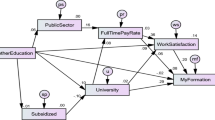Abstract
During the recent years, many stakeholders like researchers, policymakers and even students have paid more attention to the efficiency and performance of higher education. Although no single indicator is sufficient to describe the organizational quality of the university, graduation rate has become one of the key indicators of university success. There are clearly many factors that affect students' ability and willingness to complete their studies successfully, but previous studies have clearly shown that high student satisfaction has a positive impact on the graduation rate. The focus of this paper is on the part-time Master of Engineering programs of a Finnish university of applied sciences (UAS), and the empirical part of the study examines the relationship between student satisfaction and graduation rates based on the internal graduation records of the UAS and the data from the Finnish national student satisfaction survey (AVOP). The findings of the study suggest that student satisfaction is a multidimensional structure, and satisfaction with the content of the studies and the thesis has a statistically significant impact on graduation from the Finnish Master of Engineering programs.
Access this chapter
Tax calculation will be finalised at checkout
Purchases are for personal use only
Similar content being viewed by others
References
Tran, T., Kha, G., Duyen, T., Linh, T.: Research on factors affecting the postgraduate students’ satisfaction in the quality of training services in accounting at the training institutions in Hanoi. Am. J. Educ. Res. 6(5), 512–518 (2018)
Bryant, J., Bodfish, S.: The Relationship of Student Satisfaction to Key Indicators for Colleges and Universities. National Research Report (2014)
Aljohani, O.: A review of the contemporary international literature on student retention in higher education. Int. J. Educ. Literacy Stud. 4(1), 40–52 (2016)
Rotem, N., Yair, G., Shustak, E.: Dropping out of master’s degrees: objective predictors and subjective reasons. High. Educ. Res. Dev. 40(5), 1070–1084 (2021)
DeShields, O., Kara, A., Kaynak, E.: Determinants of business student satisfaction and retention in higher education: applying Herzberg’s two-factor theory. Int. J. Educ. Manage. 19(2), 128–139 (2005)
Avero, T., Tricahyono, D.: The relationship between collaboration factors, teamwork satisfaction, and student satisfaction: a conceptual paper. In: Sustainable Future: Trends, Strategies and Development – Noviaristanti & Hway Boon (eds). (2023)
Shonfeld, M.: Factors affecting student-teacher satisfaction with a multi-college online collaborative course. Australas. J. Educ. Technol. 37(6), 193–205 (2021)
Alnawas, I.: Student orientation in higher education: development of the construct. High. Educ. 69(4), 625–652 (2015)
Cook, B., Pullaro, N.: College Graduation Rates: Behind the Numbers. American Council on Education (2010). https://www.acenet.edu/Documents/College-Graduation-Rates-Behind-the-Numbers.pdf
OECD: Education at Glance 2022: OECD Indicators. OECD Publications (2022).
De Witte, K., Cabus, S., Thyssen, G., Groot, W., Maassen van den Brink, H.: A critical review of the literature on school dropout. Educ. Res. Rev. 10, 13–28 (2013)
Olaya, D., Vásquez, J., Maldonado, S., Miranda, J., Verbeke, W.: Uplift Modeling for preventing student dropout in higher education. Decis. Support Syst. 134, 113320 (2020)
Tinto, V.: Dropout from higher education: a theoretical synthesis of recent research. Rev. Educ. Res. 45(1), 89–125 (1975)
Astin, A.: Assessment for Excellence. Macmillan, New York (1991)
Fung, T.: Analysis of Graduation Rates for Four-Year Colleges: A Model of Institutional Performance using IPEDS, Doctoral dissertation, University of North Texas (2010)
Miller, K.: Predicting Student Retention at Community Colleges. Ruffalo Noel Levitz, Cedar Rapids (2015)
Bryant, J., Bodfish, S., Stever, D.: The Correlation between College Student Satisfaction and Alumni giving. Ruffalo Noel Levitz, Cedar Rapids (2015)
Starr, A., Betz, E., Menke, J.: Differences in college student satisfaction: academic dropouts, nonacademic dropouts, and nondropouts. J. Couns. Psychol. 19(4), 318–322 (1972)
Suhre, C., Jansen, E., Harskamp, E.: Impact of degree program satisfaction on the persistence of college students. High. Educ. 54, 207–226 (2007)
Mosert, K., Pienaar, J.: The moderating effect of social support on the relationship between burnout, intention to drop out, and satisfaction with studies of first-year university students. J. Psychol. Africa. 30(3), 197–202 (2020)
Schreiner, L.: Linking Student Satisfaction and Retention. Ruffalo Noel Levitz, Cedar Rapids (2009)
Hwang, Y., Choi, Y.: Higher education service quality and student satisfaction, institutional image, and behavioral intention. Soc. Behav. Pers. 47(2), 1–12 (2019)
Hew, K.F., Hu, X., Chen, Q., Tang, Y.: What predicts student satisfaction with MOOCs: a gradient boosting trees supervised machine learning and sentiment analysis approach. Comput. Educ. 145, 103724 (2020)
Acknowledgements
I would like to acknowledge Statistics Finland, the Ministry of Culture and Education and the Finnish National Agency for Education for collecting and sharing the AVOP data for research purposes.
Author information
Authors and Affiliations
Corresponding author
Editor information
Editors and Affiliations
Rights and permissions
Copyright information
© 2023 The Author(s), under exclusive license to Springer Nature Switzerland AG
About this paper
Cite this paper
Koivisto, M. (2023). Student Satisfaction and Graduation Rates in Finnish Master of Engineering Programs. In: Guralnick, D., Auer, M.E., Poce, A. (eds) Creative Approaches to Technology-Enhanced Learning for the Workplace and Higher Education. TLIC 2023. Lecture Notes in Networks and Systems, vol 767. Springer, Cham. https://doi.org/10.1007/978-3-031-41637-8_23
Download citation
DOI: https://doi.org/10.1007/978-3-031-41637-8_23
Published:
Publisher Name: Springer, Cham
Print ISBN: 978-3-031-41636-1
Online ISBN: 978-3-031-41637-8
eBook Packages: Intelligent Technologies and RoboticsIntelligent Technologies and Robotics (R0)




